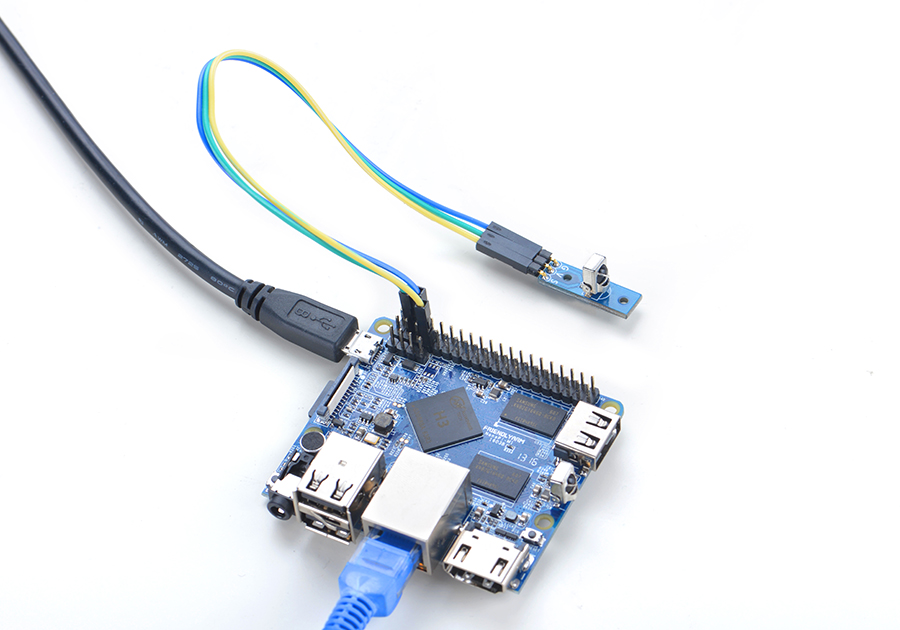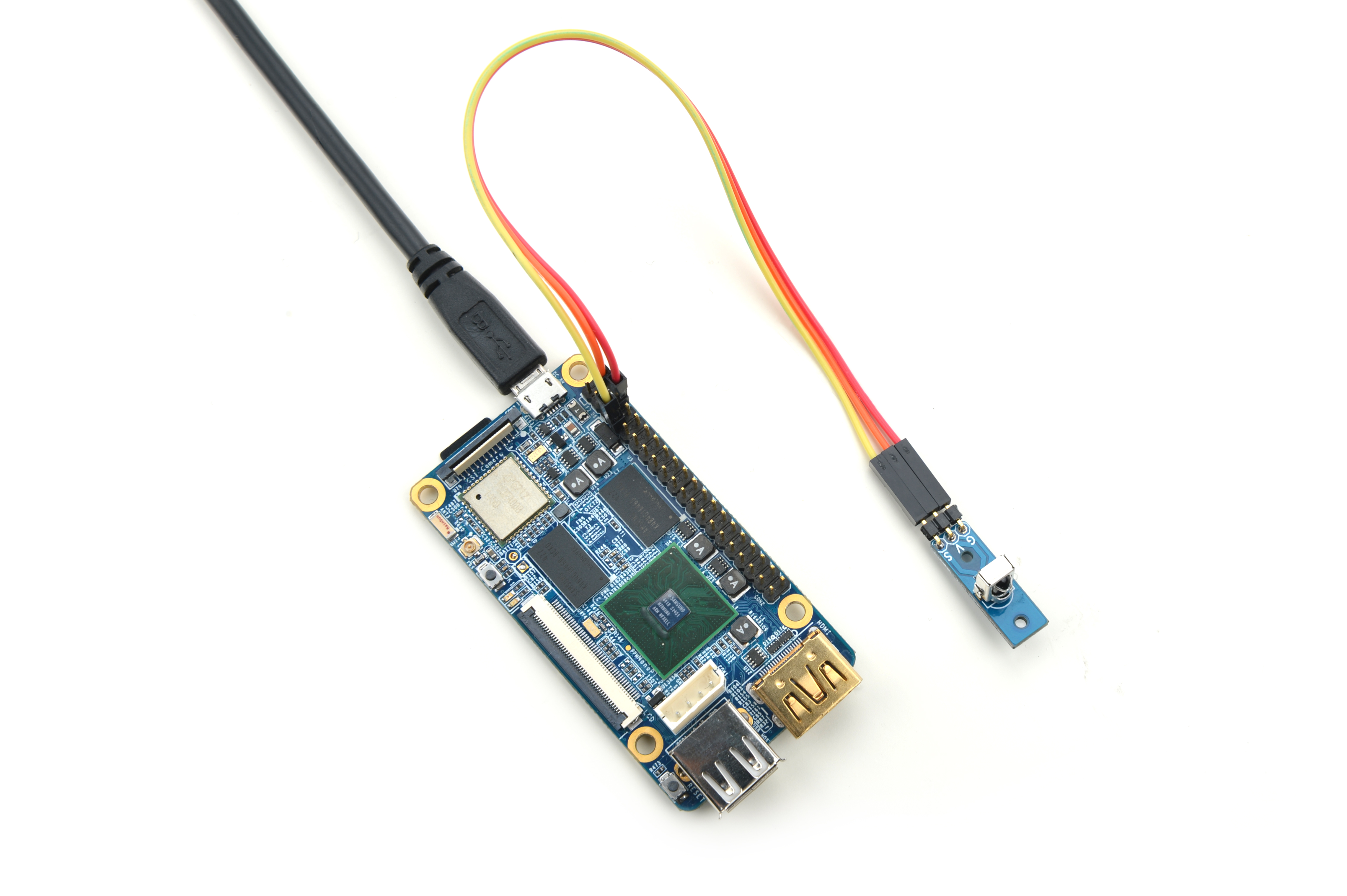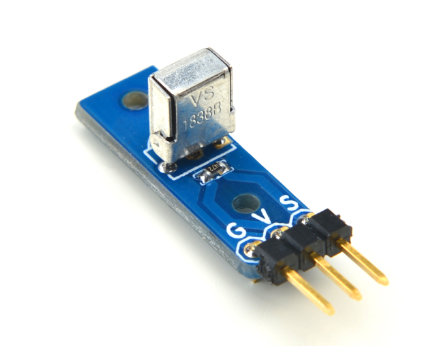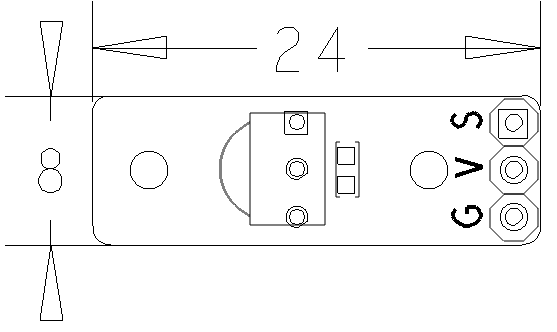Matrix - IR Receiver
Contents
1 Introduction
- The Matrix-IR receiver is a 38KHz infrared receiver that receives 38KHz signals from an infrared remote control, amplifies and filers them to other devices. Its signal decoding is implemented by programming MCU.
- Transmission distance: 12 ~ 13 meters.
2 Features
- GPIO control, 3.3/5V
- Small
- 2.54mm spacing pin header
- PCB Dimension(mm): 8 x 24
- Pin Description:
| Pin | Description |
| S | GPIO |
| V | Supply Voltage 5V |
| G | Ground |
3 Basic Device Operation
- The IR receiver contains a photo diode, amplifier, band pass filter, integrator, hysteresis comparator and etc. When the IR receiver detects infrared signals it sends them to the preamplifier and band pass filter. After the signals are processed by the band pass filter (30KHz ~ 60KHz) they will be further processed by the integrator and comparator and finally be output as High or Low.
- Note: the output signal is the reversal of the input signal.
4 Applications
4.1 Connect to NanoPi M1
Refer to the following connection diagram to connect the module to the NanoPi M1:

Connection Details:
| Matrix-IR_Receiver | NanoPi M1 |
| S | Pin7 |
| V | Pin4 |
| G | Pin6 |
4.2 Connect to NanoPi 2
Refer to the following connection diagram to connect the module to the NanoPi 2:

Connection Details
| Matrix-IR_Receiver | NanoPi 2 |
| S | Pin7 |
| V | Pin4 |
| G | Pin6 |
4.3 Connect to NanoPi M2 / NanoPi 2 Fire
Refer to the following connection diagram to connect the module to the NanoPi M2/ NanoPi 2 Fire:
Matrix-IR_Receiver_nanopi_m2
Connection Details:
| Matrix-IR_Receiver | NanoPi M2 |
| S | Pin7 |
| V | Pin4 |
| G | Pin6 |
4.4 Connect to NanoPC-T2
Refer to the following connection diagram to connect the module to the NanoPC-T2:
Matrix-IR_Receiver_NanoPC-T2
Connection Details:
| Matrix-IR_Receiver | NanoPC-T2 |
| S | Pin15 |
| V | Pin29 |
| G | Pin30 |
5 Compile & Run Test Program
Boot your ARM board with Debian and copy the matrix code:
$ apt-get update && apt-get install git $ git clone https://github.com/friendlyarm/matrix.git
If your cloning is done successfully a "matrix" directory will be generated.
Compile and install Matrix:
$ cd matrix $ make && make install
Run test program:
$ matrix-ir_receiverNote: this module is not plug and play therefore before running the module please make sure it is connected to an ARM board.
Here is what you should observe:
Press the IR remoter 0: Type=4, Code=4, Value=3b0d 1: Type=0, Code=0, Value=0 2: Type=4, Code=4, Value=3b12 3: Type=0, Code=0, Value=0 4: Type=4, Code=4, Value=3b15 5: Type=0, Code=0, Value=0
When you point our RC-100 controller to it and press any key on the controller an event will be detected.
6 代码说明
所有的开发板都共用一套Matrix代码,本模块的测试示例代码为matrix-ir_receiver,内容如下:
int main(int argc, char ** argv) { int board, i, j; int retSize = -1; char *devName = GPIO_IR_DEV; int pin = GPIO_PIN(7); char modStr[BUF_SIZE]; struct input_event evKey; if ((board = boardInit()) < 0) { printf("Fail to init board\n"); return -1; } if (board == BOARD_NANOPI_T2) pin = GPIO_PIN(15); sprintf(modStr, "modprobe %s gpio=%d", DRIVER_MODULE, pintoGPIO(pin)); system(modStr); signal(SIGINT, IRIntHandler); sleep(1); irFD = openHW(devName, O_RDWR); if (irFD < 0) { printf("Fail to open GPIO IR device\n"); goto err; } printf("Press the IR remoter\n"); for (i=0; i<IR_EVENT_TIMES; i++) { if (selectHW(irFD, 0, 0) == 1) { retSize = readHW(irFD, &evKey, sizeof(struct input_event)); for (j=0; j<(int) retSize / sizeof(struct input_event); j++) printf("%2d: Type=%d, Code=%d, Value=%x\n", i, evKey.type, evKey.code, evKey.value); } } closeHW(irFD); err: system("rmmod "DRIVER_MODULE); return 0; }
API说明参考维基:Matrix API reference manual
7 Resources
8 Update Log
8.1 Feb-24-2016
- Added the driver's source code location in Section 5.2

